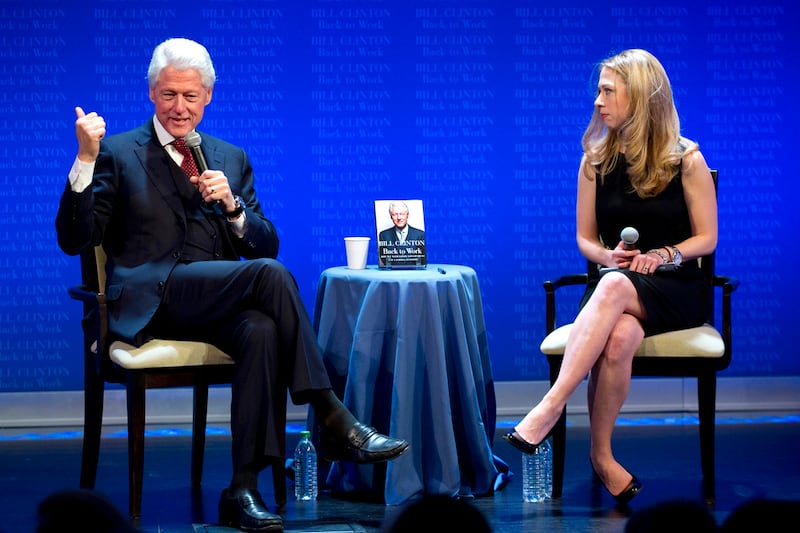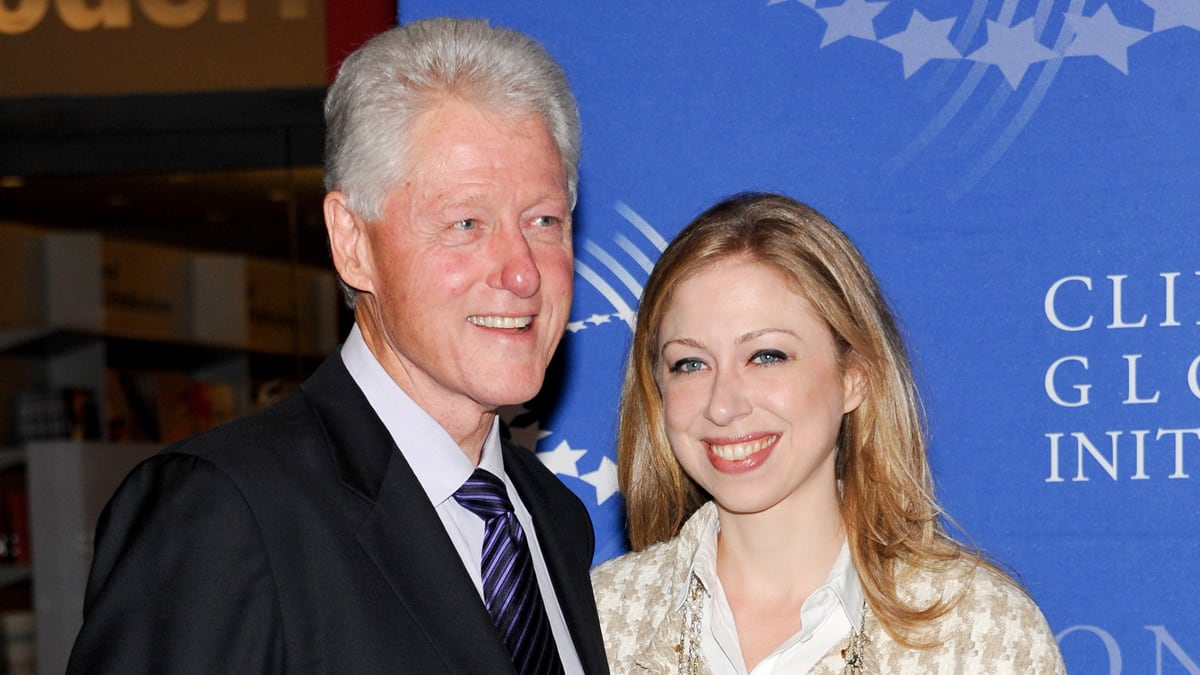In a moment of unlikely brilliance involving a rock-and-roll legend in a hotel ballroom, Bill Clinton ended Tuesday with a demonstration of the smart heart that is at the core of his own undimmed greatness, why he remains a mesmerizing figure in any venue.
A measure of that allure came earlier in the day outside a midtown Manhattan bookstore, where people had been waiting as long as 19 hours for him to sign a copy of his book Back to Work. The first in line, 35-year-old Ben Hur of Queens, had been there since 5:30 p.m. the previous day.
“I’m lucky, it’s a big privilege,” said Hur, who was named after the movie. “A wonderful president! He helps us all!”
ADVERTISEMENT
Clinton looked each of them in the eye and thanked them for coming, and said he was glad to see them—and his smile made it seem true, even if he was not a candidate for anything. Their dazzled, giddy looks as they stepped away left no doubt as to whom they—and a deciding majority of Americans—would vote for if Clinton could run for president.
“Based on his record, I’d say yes,” said 19-year-old Bernard Lin of Rutgers University, who was born two days before Clinton was elected, but could add with authority, “He was the only one to balance the budget successfully.”

The book is only 192 pages, but crammed with cogent thoughts about our present fix and what to do about it. These ideas were the subject of a discussion that evening between Clinton and his daughter, Chelsea, on the stage of the auditorium at the New-York Historical Society.
“It’s brief, it’s distilled, it’s action-oriented,” Chelsea said of the book.
Clinton clearly wishes he were back in action rather than only formulating and proposing, but he seemed the happiest of dads to be discussing the issues with a daughter whose smarts do not come from nowhere. He noted that traditionally, Americans vote for Democrats in time of trouble.
“People tend to hire Democrats when things are messed up,” he said.
But in the last congressional elections, the Democrats failed to counter anti-government sentiment. He noted that he had just had his picture taken in front of a copy of the Stamp Act that was on loan to the Historical Society from England, and he was well aware that the country had been founded in rebellion. But the passions of our present politics seem based more on reflexive partisanship.
“The election was almost completely fact-free,” he said. “And that’s not good for us.”
He noted that there had never been a successful society where the government was considered an evil and the rich were not duly taxed. “Never, never, never,” he said.
He allowed that he had erred in one section of the book where he criticized the present president for not attempting to raise the federal debt ceiling during the lame-duck period after the latest elections, when the Democrats still controlled Congress. Clinton he said he had since learned that the White House had been told that any such move would be met with a filibuster in the Senate.

“I’m trying to force myself to say once a day, ‘I don’t know’ or ‘I was wrong,’” Clinton said.
He seemed most excited when he spoke about ideas that had been proven right with practical application. He called on everybody to make whatever concrete contributions they can to the public good.
“I’m happier if I can find something to look forward to in the morning instead of just griping,” he said. “Make something good happen. Just do something.”
“Thank you all very much,” Chelsea said to the audience. “I hope you’ll do that—and buy the book.”
The next event involved not Clinton’s book, but an autobiography by Keith Richards of the Rolling Stones. Richards was to receive the Distinguished Biography Prize at the Normal Mailer Center’s Third Annual Benefit Gala at the Mandarin Oriental Hotel in Manhattan. Clinton had been asked to make the presentation.
Earlier in the night, awards went to Gay Talese, Elie Wiesel, and Arundhati Roy, along with a high-school teacher and a trio of very young writers. Clinton sat off to the side in the dimly lit ballroom with his Secret Service detail, an aide holding a flashlight to assist him as he intently studied what apparently were notes for his impending remarks.
An almost surreal moment then came when the former president of the United States stepped up to present a literary award to the lead guitarist of the Rolling Stones. At least part of the reason that Clinton had been so intent in his preparation began to become clear when he said that his recently deceased and deeply loved mother-in-law, Dorothy Rodham, had been a huge fan of Richards.
“Do you have any idea what it’s like to have a 92-year-old groupie living in your house?” he asked.
When the Clintons and Rodham were visiting Donna Karan’s home in the Caribbean, Richards had come by from his own home nearby. Rodham had changed her clothes for the occasion and for an hour was the very happiest of 92-year-olds.
“I said, ‘Dorothy, what do you think?’” Clinton recalled to the gathering. ”She said, ‘I always did like those bad boys.’”
Clinton read from a New York Times review of Richards’s book that called the guitarist the “coolest dude on the planet” and “the one life form other than cockroach capable of surviving a nuclear blast.”
Clinton turned serious, saying that in his time in politics “half the people I met thought I was by definition a phony.” He quoted where the Richards book says, “Image is like a long shadow. Even when the sun goes down, you can see it.”
Then came Clinton’s moment of brilliance. He sought to describe the Keith Richards who is not the shadow, not the image.
“He’s a good guy,” Clinton said. “He’s a brilliant musician. He’s had an unlikely life. Most people who did something special did it because they had something special inside them. It wasn’t an accident.”
There was an instant’s pause in the room, when people just seemed to know Clinton had it exactly right. And it was thanks to the smart heart that is the something most special inside the man who would so love to still to be our president.
Afterwards, Richards drew smiles and congratulations, but it was Clinton who had the greater allure, an allure that much stronger for these troubled times.
Richard represents music that can transport you, take you away from those troubles. Clinton could solve those troubles, and he even has his own little touch of the rascal—just a bit of the bad boy almost everybody likes.






